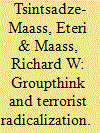| Srl | Item |
| 1 |
ID:
134984


|
|
|
|
|
| Summary/Abstract |
Why do groups adopt terrorism? Major theories of terrorist radicalization assume it to be a rational process whereby groups select terrorism as the policy most likely to advance their goals. Not all terrorism is rational, however, and these theories cannot explain cases when groups pursue terrorism despite it being self-defeating. We distinguish between rational and irrational terrorism, and explain the latter using social psychology's groupthink mechanism. Although terrorists are widely assumed to be vulnerable to groupthink, empirical work on the phenomenon has focused overwhelmingly on decision-making by national executives. We firmly establish the link between groupthink and terrorist radicalization by tracing groupthink's operation through the development of the Weather Underground, an American terrorist group that emerged in the late 1960s and conducted six years of bombings against the U.S. government. All of the antecedent conditions, symptoms, and decision-making defects predicted by groupthink are evident in the Weather Underground, providing valuable evidence of the dangers of irrational radicalization and offering lessons for its prevention.
|
|
|
|
|
|
|
|
|
|
|
|
|
|
|
|
| 2 |
ID:
132177


|
|
|
|
|
| Publication |
2014.
|
| Summary/Abstract |
Recent scholarship has called for additional research into the role of charismatic authority in terrorist groups and the process of radicalization. However, the sociological concepts of charisma and charismatic authority are being widely misused in terrorism studies. Current radicalization research often indirectly flirts with core concepts of charismatic authority, but fails to properly tap into its analytical utility. This article proposes to begin addressing this gap in knowledge in three ways, with: (1) a synthesis of social scientific research on charismatic authority, (2) a critical analysis of how charismatic authority is being misused and overlooked in the terrorist radicalization literature, and (3) an exploration of challenges and opportunities for future research concerning charismatic authority and terrorist radicalization.
|
|
|
|
|
|
|
|
|
|
|
|
|
|
|
|